Digitalization in Modern Judicial Procedure
Abstract
The purpose of the article is to analyze and identify the features of the «digital court» as phenomena generated by modern information and digital culture; how that judicial activity and judicature are no exception. The methodological basis of the article is a set of methodological approaches and systems of philosophical and general scientific methods. Determinants are the method of dialectics, comparative and hermeneutic, and also constructivism and anthropology as methodological approaches. Scientific novelty.The article analyzes the changes in the domestic legal proceedings, due to the spread and application of digital technologies in all areas of social life. It is pointed out that advances in digital technologies are now being introduced in such a phenomenon as «digital court», the operation of which should improve access to justice. In modern law enforcement also presents the processes of automation and algorithms, the use of which involves the use of robots and artificial intelligence. Conclusions. Digitalization as a modern phenomenon permeates all spheres of social life. Digitization is the element of the third and fourth industrial revolution, which «work» in the field of law enforcement, in particular in litigation.
Keywords: law enforcement; legal text; digitalization; digitalization; litigation, e-court; industrial revolution; algorithmization.
Downloads
References
Дорская А. А.,.Дорский А. Ю. Официальная политика памяти всовременной России: юридическое измерение. Вестник Санкт-Петербургского университета.2018. № 2. С. 124–138. (Серия «Право»). doi: https://doi.org/10.21638/11701/spbu14.2018.201.
Фрончко В. До питання про цифрову юриспруденцію. Актуальні проблеми правознавства. 2019. Вип. 2 (18). C. 144–148.
Краснов Є. «Електронний суд» потребує не лише технологічного вдосконалення, а й правового. URL: http://rsu.gov.ua/ua/news/egor-krasnov-elektronnij-sud-potrebue-ne-lise-tehnologicnogo-vdoskonalenna-a-j-pravovogo.
Моисеева А. А. Условия и последствия диджитализации современного общества: социально-экономический анализ. Вестник Томского государственного университета. 2017. № 39. С. 216–226. doi: https://doi.org/10.17223/1998863ɏ/39/24.
Пашенцев Д. А., Алимова Д. Р. Новации правотворчества в условиях цифровизации общественных отношений. Государство и право. 2019. № 6. C. 102–106. doi: https://doi.org/ 10.31857/S013207690005265-3.
Пашенцев Д. А. Особенности правоприменения в условиях цифровизации общественных отношений. Вестник Санкт-Петербургского университета. 2020. № 1. С. 35–49. (Серия «Право»). doi: https://doi.org/doi.org/ 10.21638/spbu14.2020.103.
Ракитина Л. Дистанционный судебный процесс и обеспечение иска. URL: https://wiselawyer.ru/poleznoe/44100-distancionnyj-sudebnyj-process-espechenie-iska.
Riordan M., Hoddeson L., Narayanamurti V. Crystal fire: The birth of the information age. Physics Today. 1998. T. 51. 64 р.
Schwab K. The Fourth Industrial Revolution. Crown Business. 2017. 172 р.
Васильєв С. В. Цивільний процес : підручник. Київ : Алерта, 2019. 506 с.
Vovk V., Kaljuzhnyj R. The rights of ingumans: philosophical and outline education. EURÓPSKA VEDA. Vedecký časopis. Vedecký časopis. 2019. No. 3. P. 105–109.
Abstract views: 435 PDF Downloads: 1273
Copyright (c) 2021 Philosophical and Methodological Problems of Law

This work is licensed under a Creative Commons Attribution-NonCommercial-NoDerivatives 4.0 International License.
- Authors reserve the right to authorship of their own work and transfer to the magazine the right of the first publication of this work under the terms of the Creative Commons Attribution License, which allows other persons to freely distribute published work with mandatory reference to authors of the original work and the first publication of an article in this magazine.
- Authors have the right to enter into separate additional agreements on non-exclusive dissemination of the work in the form in which it was published in the journal (for example, to post an article in the institution's repository or to publish as part of a monograph), provided that the link to the first publication of the work in this journal is maintained.
- The journal's policy allows and encourages the posting of articles by authors on the Internet (for example, in electronic storehouses of institutions or on personal websites), both before the submission of this manuscript to the editorial office and during its editorial processing, as this contributes to the creation of a productive scientific discussion and positively affects the efficiency and dynamics of citing the published work.




